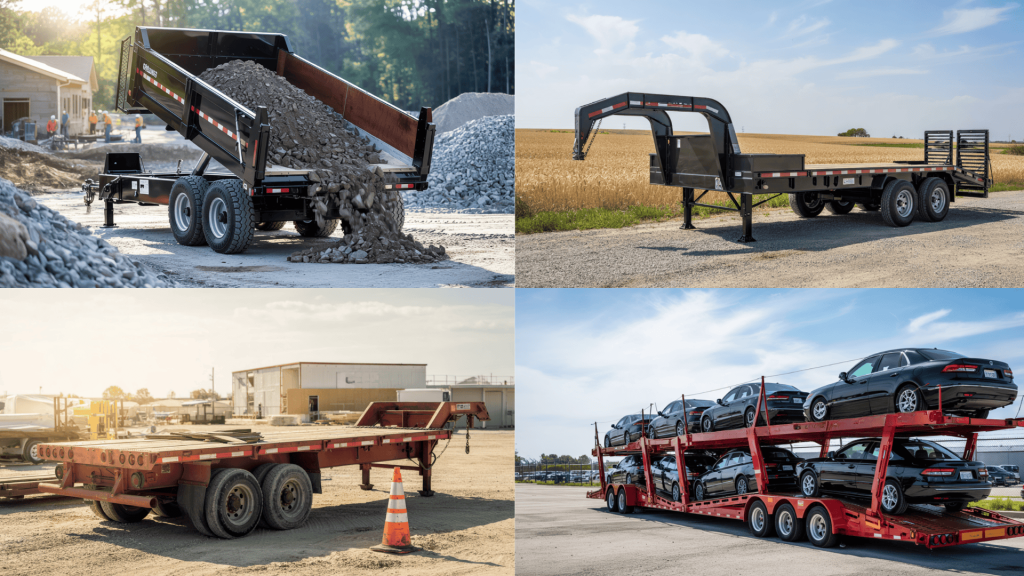There’s a trailer out there for practically everything you need to haul!
Moving lawn equipment, hauling a classic car, or transporting heavy machinery; each trailer type has its own superpower.
That little utility trailer?
Perfect for weekend DIY projects.
Need something beefier?
A gooseneck trailer laughs at heavy loads that would make other trailers cry.
The trick is matching your specific needs with the right trailer’s strengths.
Think about what you’re hauling, how often you’ll use it, and what your vehicle can actually handle.
Get this combo right, and you’ll have a reliable workhorse that pays for itself trip after trip.
What is a Trailer and How Does It Work?
A trailer is a box or flat bed on wheels that you pull behind your car or truck.
It helps you carry more stuff than what fits in your vehicle.
The trailer hooks to your car with a metal piece called a hitch.
Your car does all the work pulling, while the trailer rolls behind you.
Most trailers have their own wheels and lights so other drivers can see them.
Some big trailers even have brakes to help you stop safely.
It’s like having extra space that follows you around whenever you need to move heavy things.
Types of Trailers
Today’s trailer market has many different designs made for specific jobs and needs across all industries.
Learning about each trailer type helps you pick the right one for your needs.
Each type has special features made to handle different cargo and hauling jobs.
1. Utility Trailers: The Multi-Purpose Workhorses
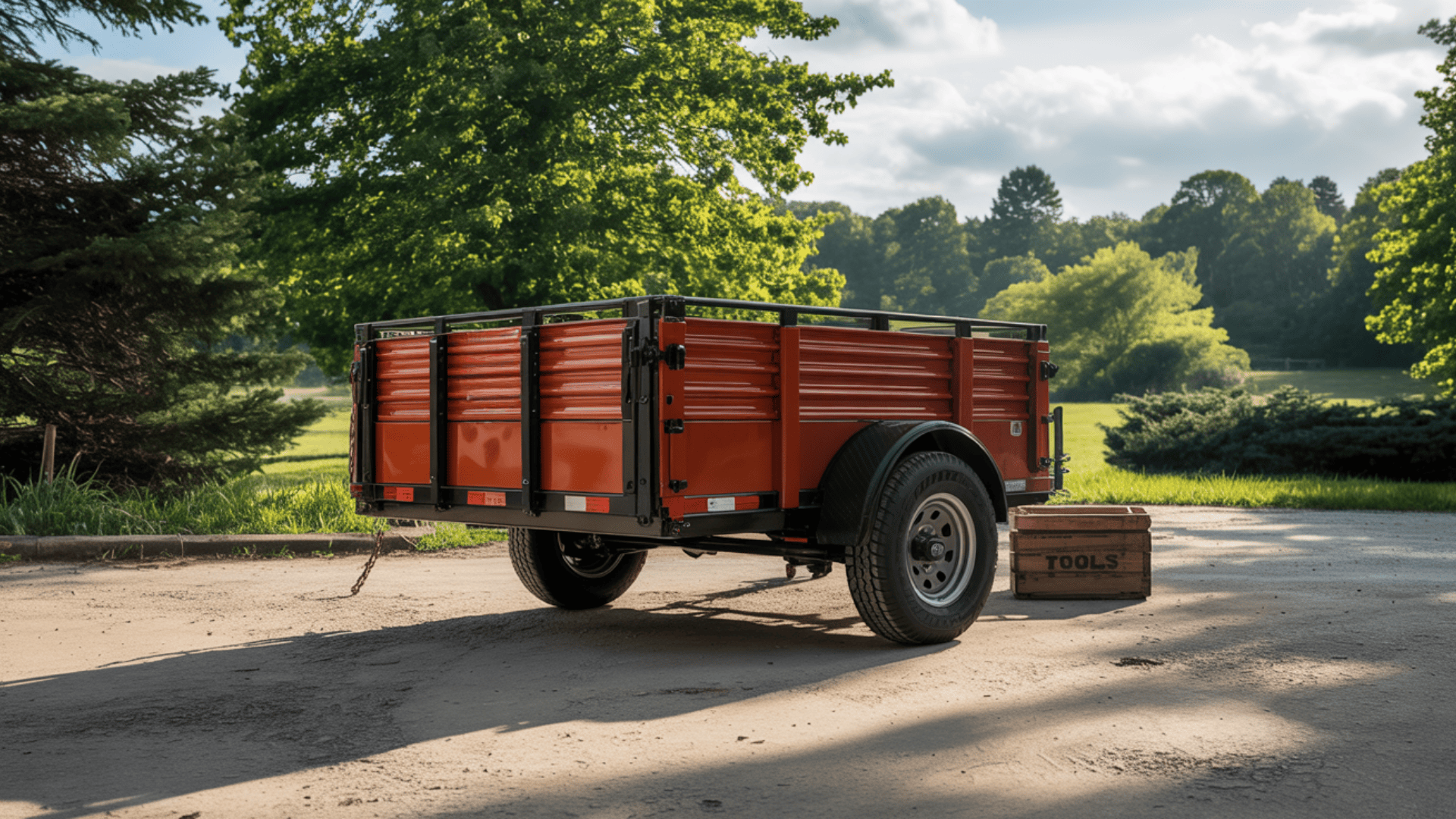
Utility trailers are like Swiss Army knives; they work for many different jobs.
They’re perfect for yard supplies, home projects, and general cargo.
These affordable trailers come with different side setups and gate options.
- Single-axle utility trailers: Light and use less gas, great for smaller loads up to 3,500 lbs, easy to move and store
- Tandem-axle utility trailers: Hold more weight and stay steady for heavier loads, spread weight better, and drive smoother
- Pipe-rail utility trailers: Have metal tube sides that hold cargo in while still letting you load from different sides
- Mesh-side utility trailers: Wire mesh panels stop small items from falling out while letting air flow through
- Solid-side utility trailers: Full metal sides keep cargo safe and look professional for business use.
2. Enclosed Trailers: Maximum Protection and Security
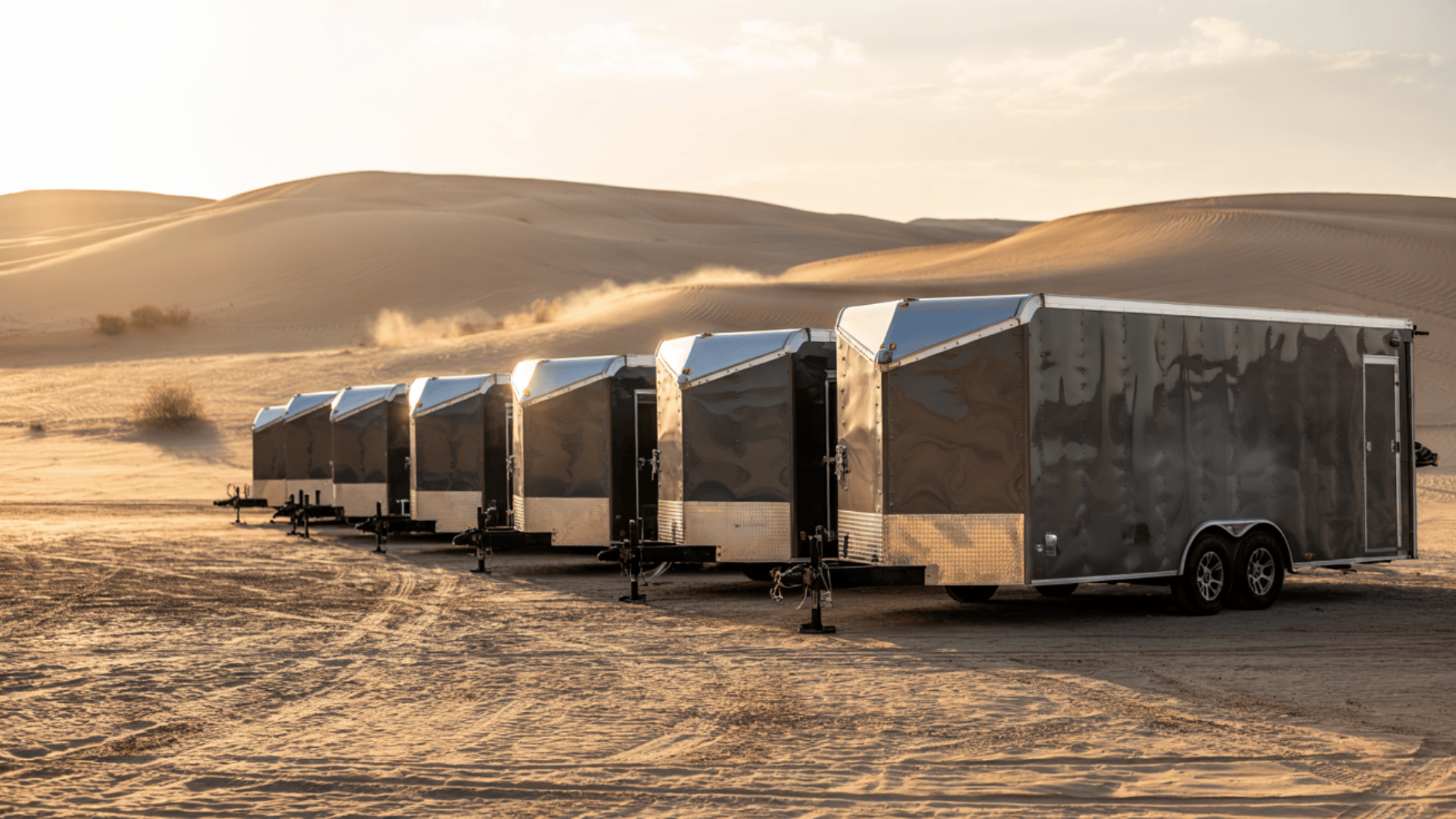
Enclosed trailers protect your cargo from weather and theft.
They have walls and a roof all around, making them perfect for tools, equipment, and items that need to stay dry.
- Cargo trailers: Basic design with back doors, perfect for general freight and weather-sensitive items
- Box trailers: Heavy-duty enclosed trailers with a strong build for tough business jobs
- V-nose enclosed trailers: Pointed front cuts through wind better and gives extra storage space inside
- Flat-front enclosed trailers: Straight front wall gives maximum space inside for the most cargo
- Motorcycle enclosed trailers: Special inside features like wheel holders, tie-downs, and protective padding
3. Flatbed Trailers: Open-Deck Flexibility
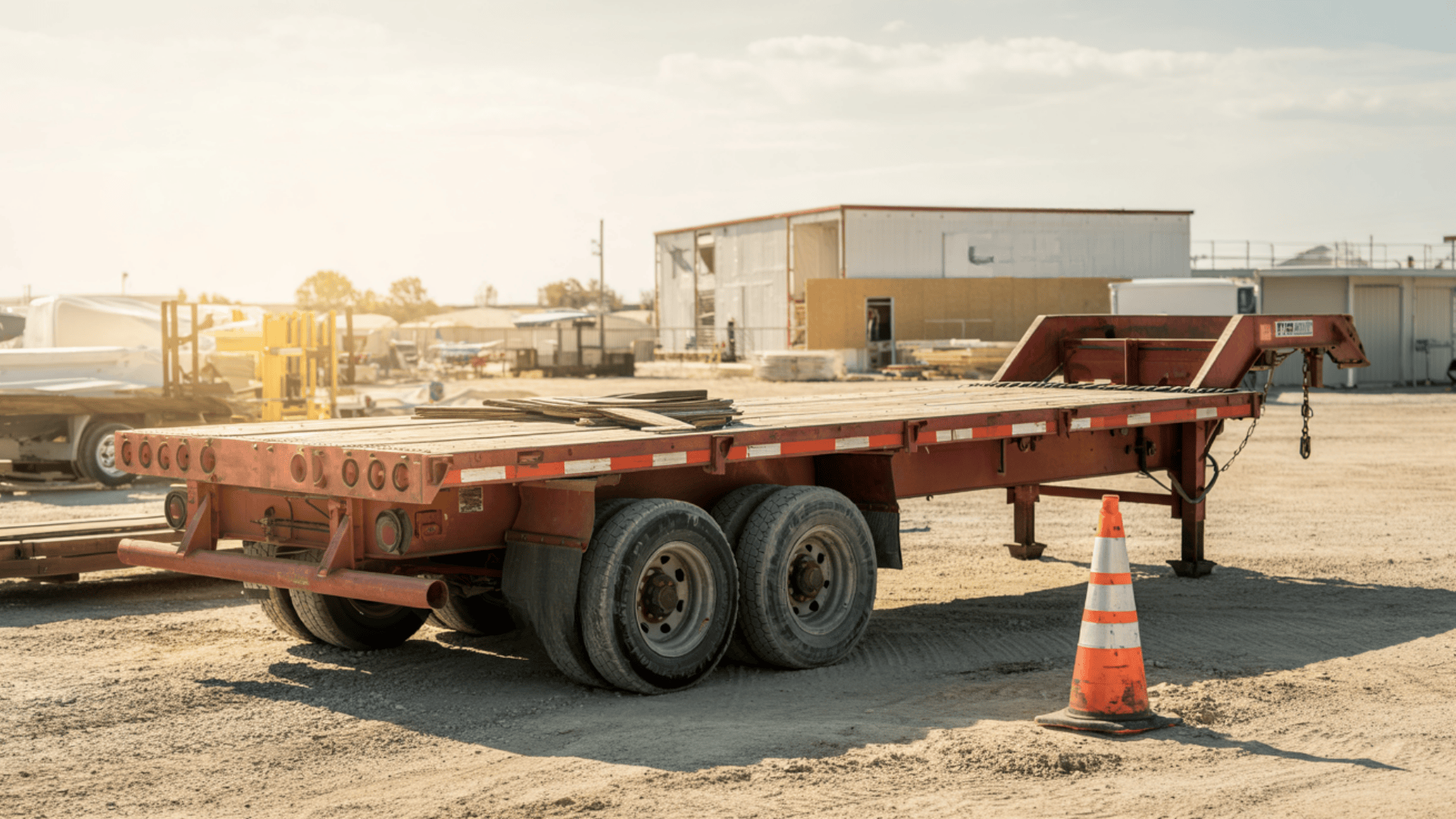
Flatbed trailers are great for big or odd-shaped cargo that won’t fit in enclosed spaces.
Their open design lets you load from any side, making them perfect for building materials, machines, and large equipment.
- Standard flatbed trailers: Basic open deck for general cargo, building materials, and equipment hauling
- Deck-over flatbed trailers: Raised deck gives maximum width and fits around bigger wheel wells
- Commercial flatbed trailers: Heavy-duty build with strong frames for frequent business use
- Heavy-duty flatbed trailers: Maximum weight capacity with stronger parts for big machines and heavy equipment
4. Dump Trailers: Effortless Unloading Power
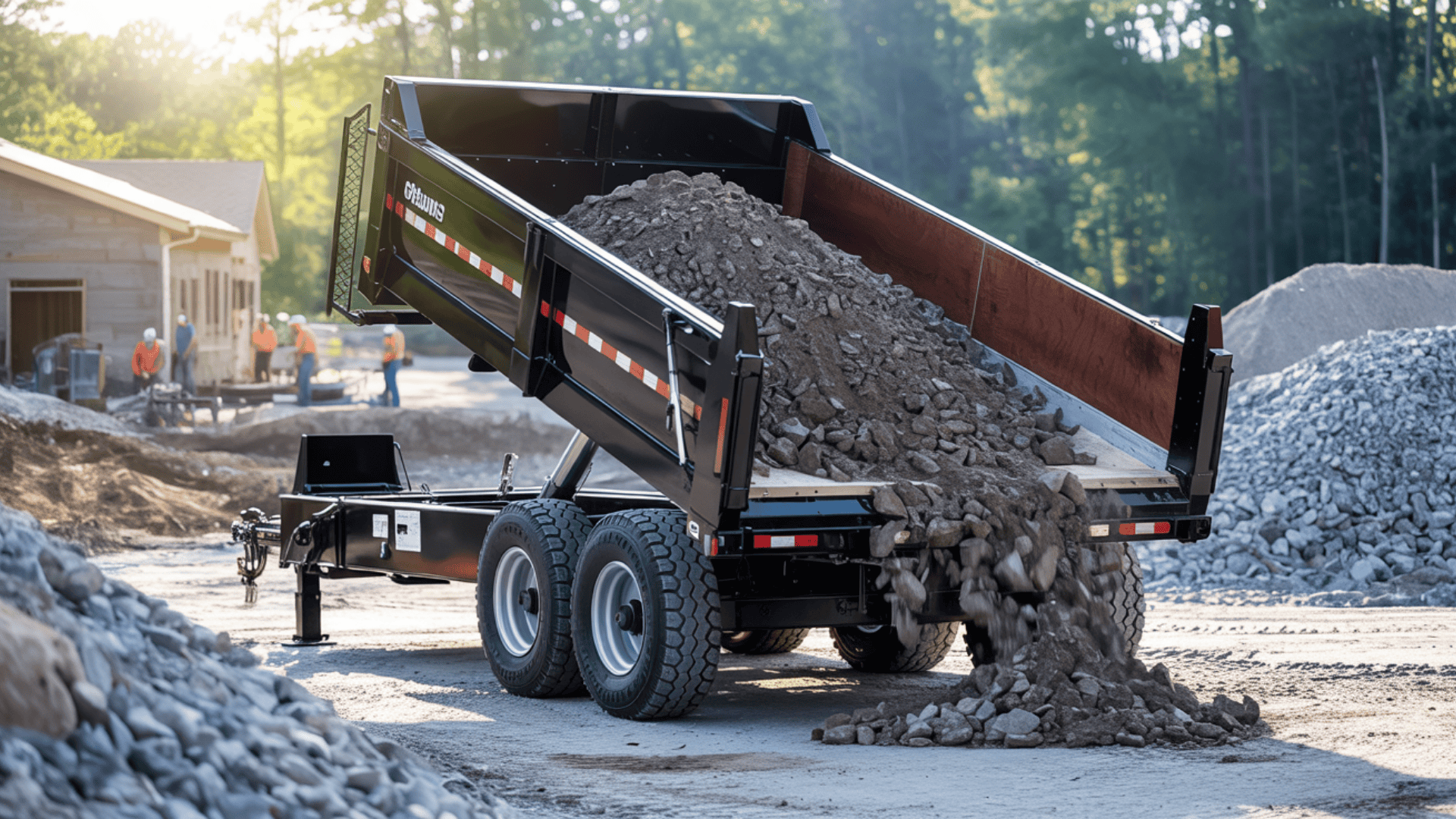
Dump trailers have hydraulic lift systems that make unloading automatic.
They’re perfect for loose materials like gravel, mulch, and construction debris.
They save time and hard work while handling bulk materials well.
- Hydraulic dump trailers: Electric or remote-controlled systems give smooth, controlled dumping for easy unloading
- Gravity dump trailers: Manual release lets gravity help dump, cheaper option for occasional use
- Side-dump trailers: Dump bed tilts to the side for precise material placement in tight spaces
- Rear-dump trailers: Traditional back-dumping, most common design for general construction and landscaping jobs
5. Equipment Trailers: Heavy-Duty Hauling Champions
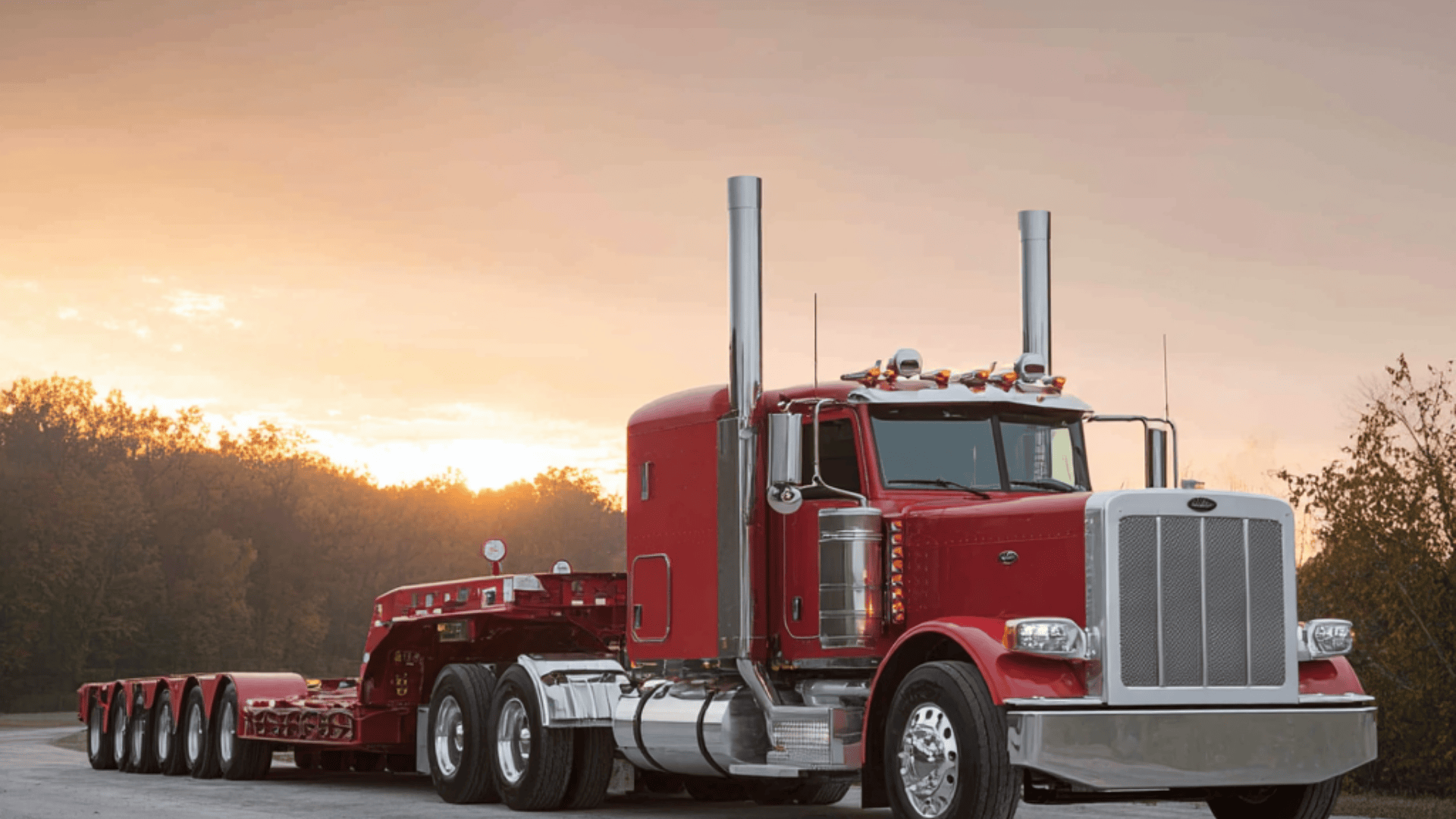
Equipment trailers are built for serious weight, with strong frames and heavy-duty parts.
They’re made to transport construction machines, farm equipment, and industrial tools safely and reliably.
- Heavy-duty equipment trailers: Maximum weight capacity with reinforced frames for bulldozers, excavators, and large machines
- Light-duty equipment trailers: Made for smaller equipment like compact tractors, mowers, and light construction tools
- Lowboy equipment trailers: Very low deck height fits tall equipment while staying within legal height limits
- Tilt-deck equipment trailers: Hydraulic or gravity tilt removes the need for ramps, making loading simpler
6. Car Hauler Trailers: Vehicle Transport Specialists
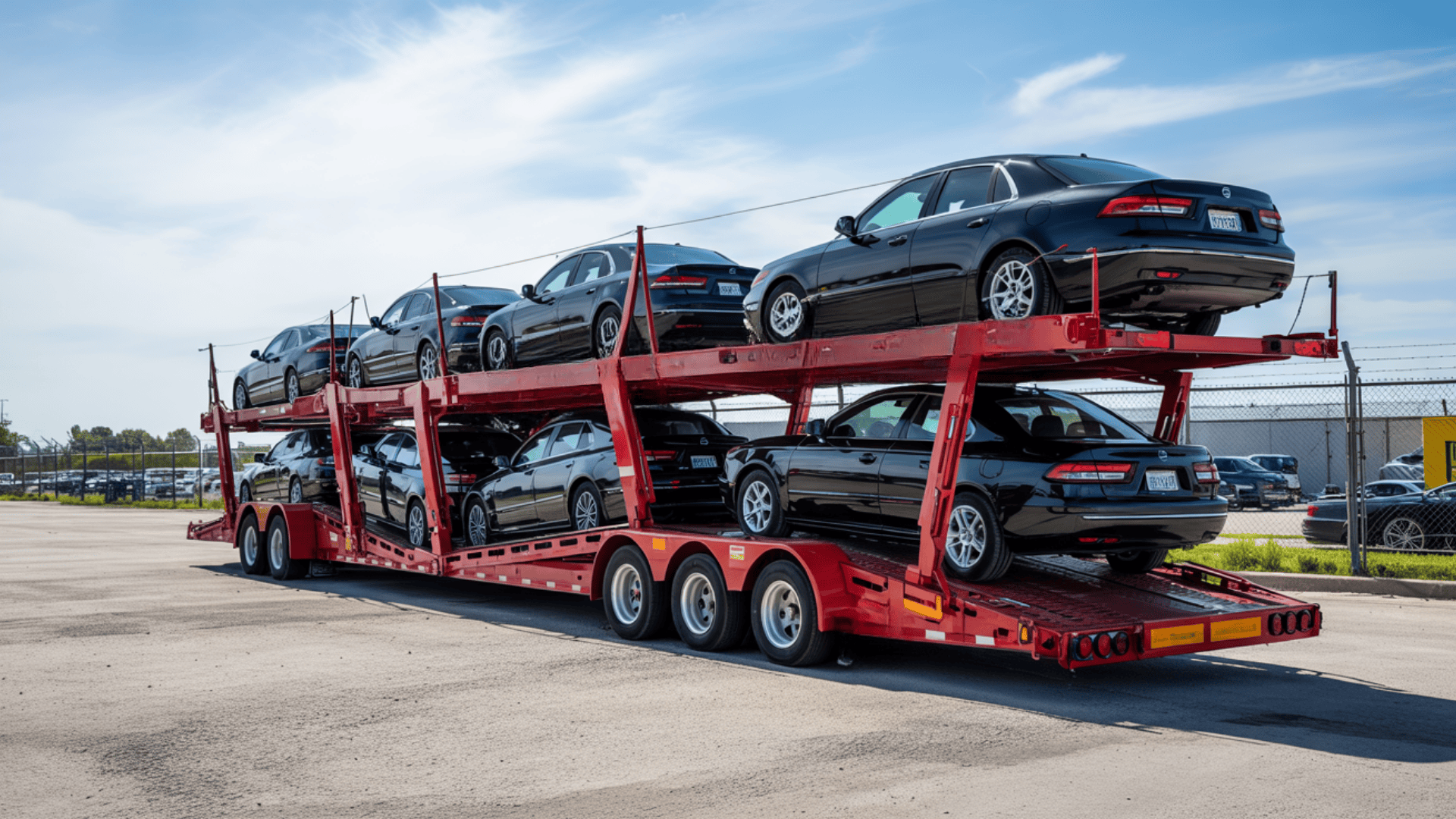
Car hauler trailers are made just for safe vehicle transport.
They have low loading angles, built-in tie-down systems, and smooth surfaces to protect car finishes during transport.
- Open car haulers: Basic flatbed design with car-specific tie-downs and ramps for cheap vehicle transport
- Enclosed car haulers: Full weather protection and security for valuable vehicles, classic cars, or luxury cars
- Tilt-deck car haulers: Tilting bed removes steep ramps, reducing the risk of vehicle damage during loading and unloading
- Multi-car haulers: Extra length fits multiple vehicles, perfect for dealers, auctions, or racing teams
7. Gooseneck Trailers: Superior Stability and Capacity
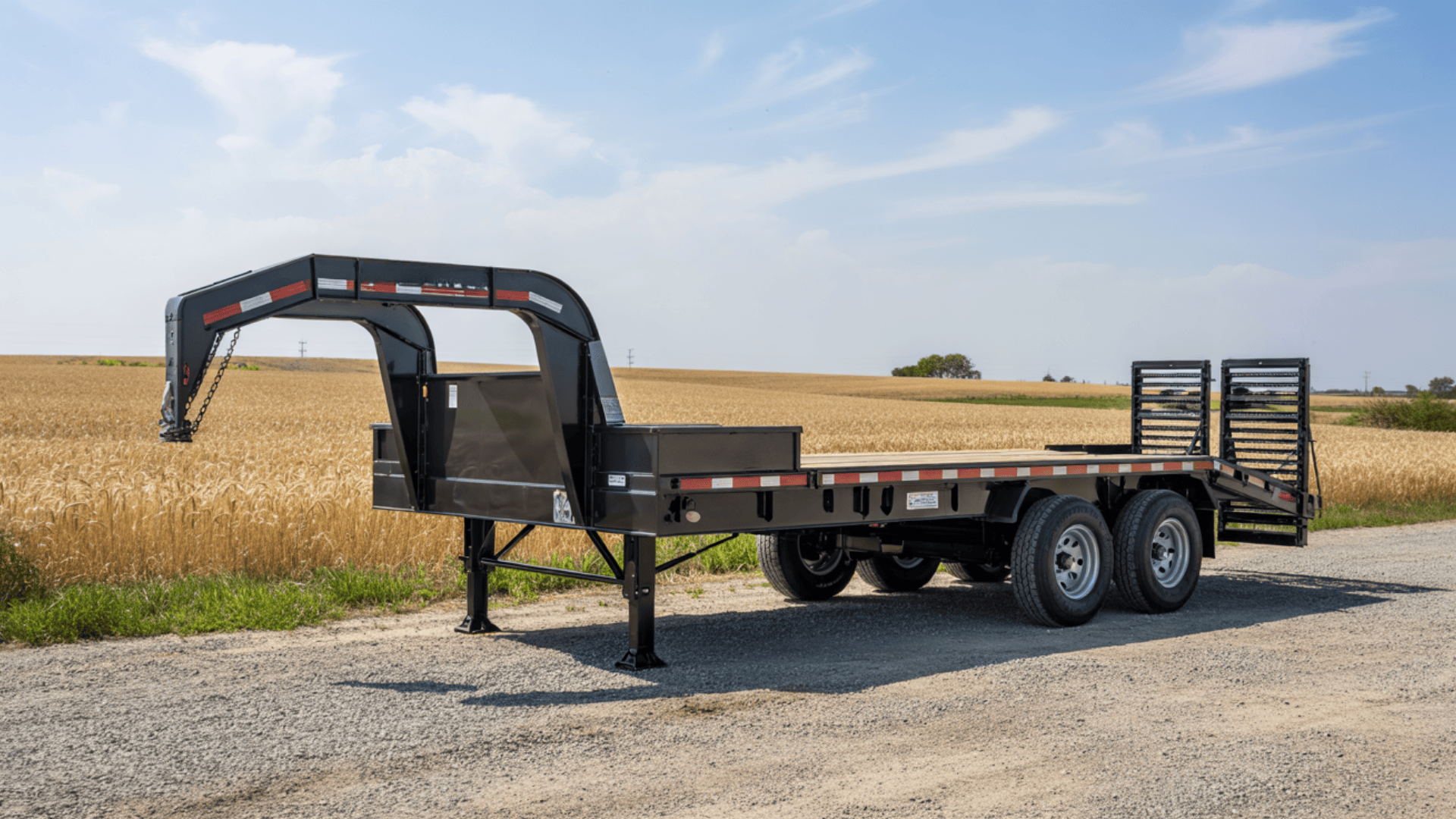
Gooseneck trailers connect in the truck bed, giving excellent stability and higher weight capacity.
They’re preferred for heavy loads and turn better than similar bumper-pull trailers.
- Flatbed gooseneck trailers: Open deck design with gooseneck hitch for maximum payload capacity and better towing stability
- Dump gooseneck trailers: Combine hydraulic dumping ability with gooseneck stability for heavy-duty material transport.
- Livestock gooseneck trailers: Special design with air flow, gates, and animal-friendly features for safe livestock transport
- Equipment gooseneck trailers: Heavy-duty build made specifically for transporting large construction and farm equipment
8. Specialized Trailers: Purpose-Built Solutions
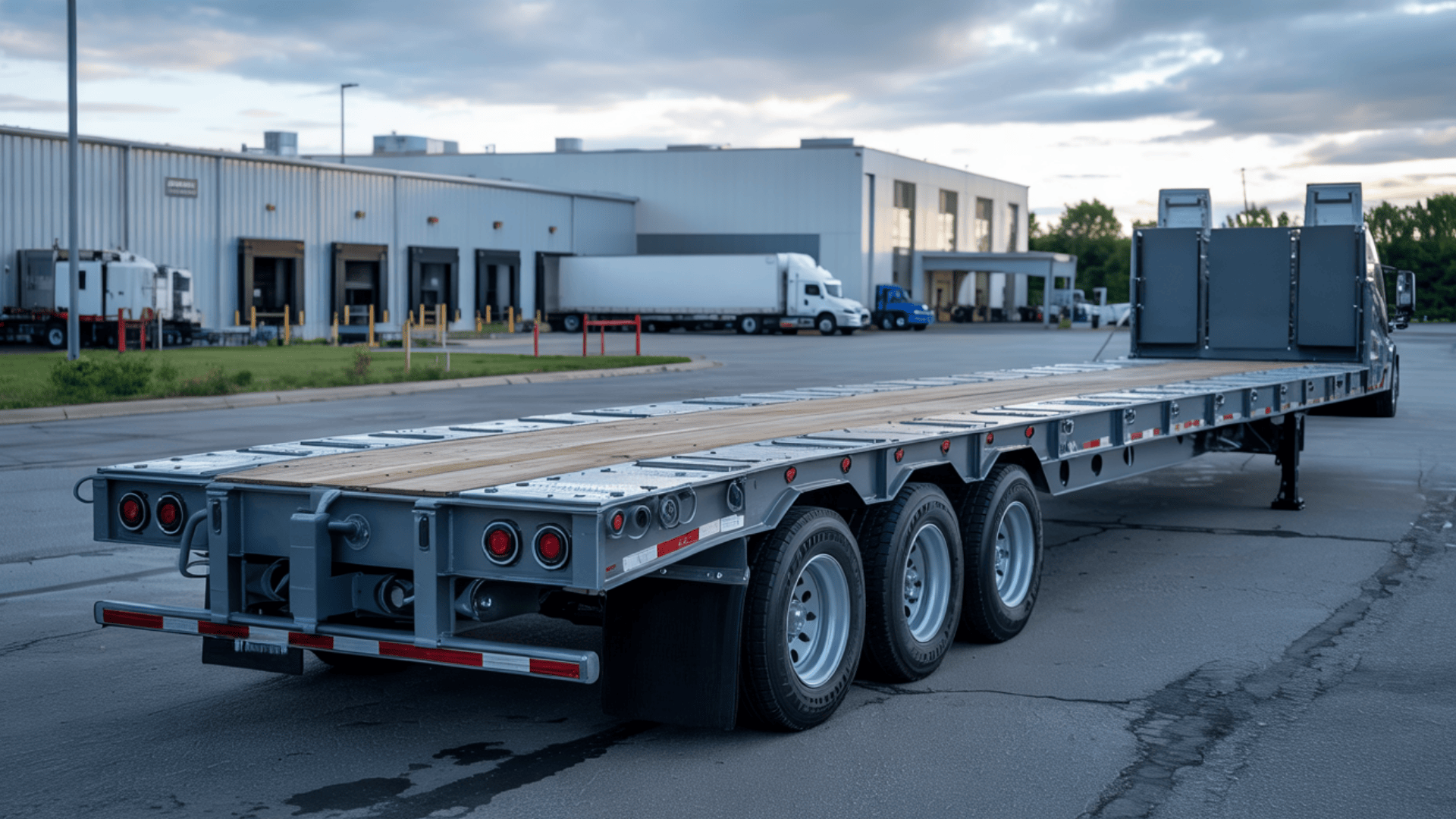
Specialized trailers serve unique jobs with custom features and designs.
Each type addresses specific industry needs with tailored functionality and specialized equipment.
- Boat trailers: Marine-specific features include adjustable supports, underwater lights, and rust-resistant parts
- Horse trailers: Specialized animal transport with air flow, padding, dividers, and safety features for horse comfort
- Travel/RV trailers: Mobile living spaces with complete amenities for recreational camping and extended travel
- Food concession trailers: Commercial kitchen facilities with serving windows, electrical systems, and health department compliance features
- Landscape trailers: Professional landscaping features including tool racks, mesh sides, and specialized storage areas
Understanding Trailer Components and Features
Learning about trailer parts is important for making smart buying decisions and ensuring the best performance for your specific needs.
| COMPONENT | OPTIONS | IMPACT |
|---|---|---|
| Axles | Single, Tandem, Tri-axle | Weight capacity and stability |
| Hitch Type | Bumper pull, Gooseneck, 5th wheel | Towing compatibility and stability |
| Brakes | Electric, Hydraulic, Surge | Safe stopping power |
| Decking | Wood, Steel, Aluminum | Durability and weight |
| Sides | Open, Rails, Solid, Mesh | Cargo containment options |
| Lighting | Standard, LED, Submersible | Visibility and compliance |
These parts work together to determine your trailer’s abilities, safety features, and suitability for specific jobs.
How to Choose the Right Trailer Type
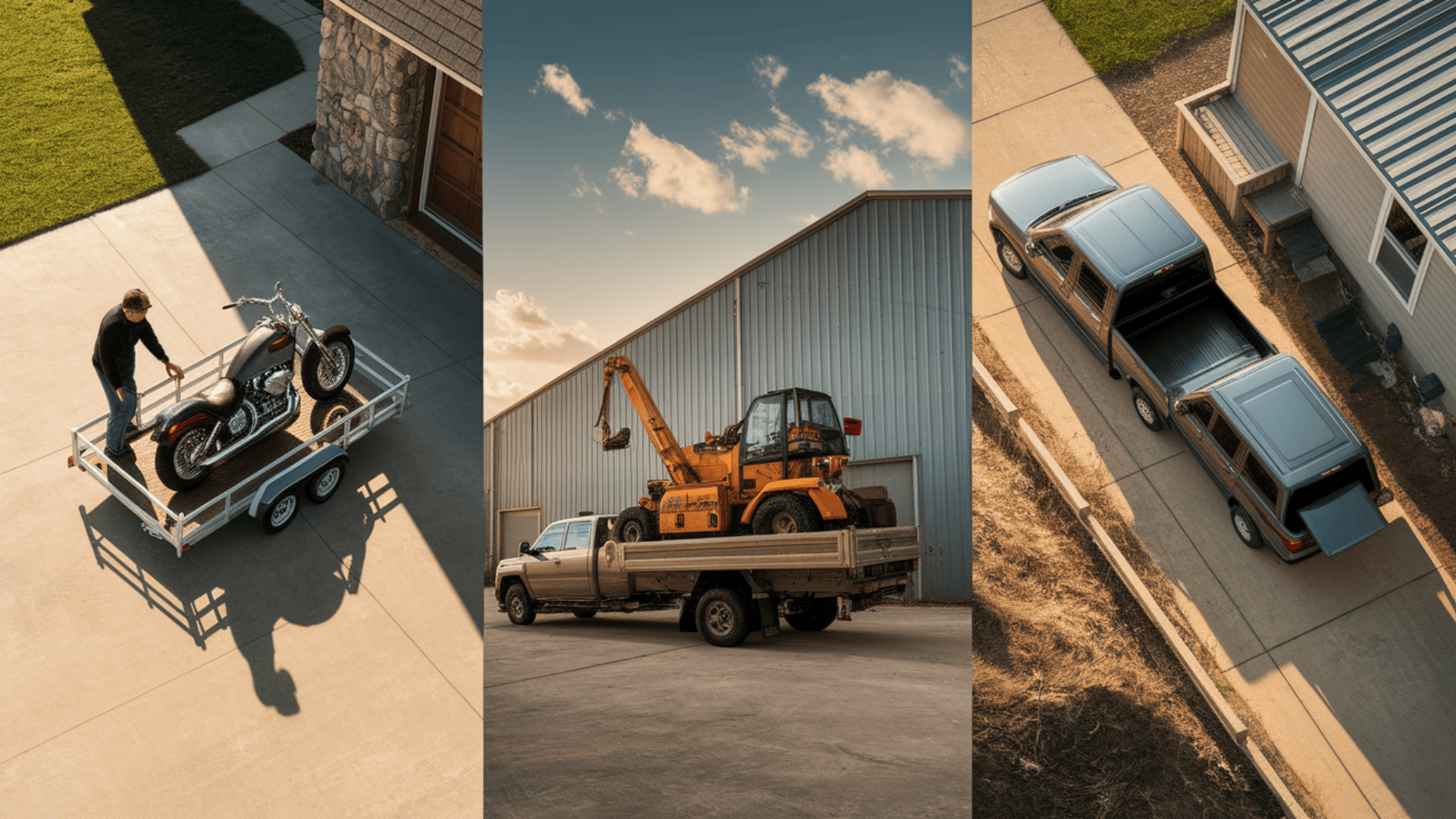
Choosing the right trailer boils down to three key questions:
- What are you hauling?
- How often?
- And can your vehicle handle it?
Start with your most common cargo: size, weight, and whether it needs protection from weather. Match this against your vehicle’s towing capacity and don’t push those limits.
Daily commercial use demands heavy-duty construction, while weekend warrior jobs can get by with lighter builds.
Don’t forget the practical stuff: storage space at home, local regulations, and room to grow.
Sometimes spending a bit more upfront for extra capacity beats buying twice when your needs expand.
Maintenance and Tips
Proper maintenance is the foundation of trailer safety, longevity, and reliable performance throughout its working life.
Regular upkeep prevents costly repairs and ensures safe operation under all conditions.
- Check tire pressure monthly and inspect for wear patterns or damage
- Test all lights before each use and replace burned-out bulbs promptly
- Inspect brake components annually and adjust as needed
- Examine frame, welds, and hitch components for cracks or excessive wear
- Grease wheel bearings according to the manufacturer’s recommendations
Using a consistent maintenance schedule protects your investment while ensuring optimal performance and safety for every haul.
Regular attention to these key areas prevents minor issues from becoming major problems.
Final Thoughts
Getting to know your trailer options isn’t just smart; it’s your ticket to stress-free hauling!
Every trailer has a job it does best, from moving lumber to transporting your prized muscle car.
Keep up with basic maintenance, follow the rules, and respect those weight limits. Do this right, and your trailer becomes more than just a cargo hauler.

